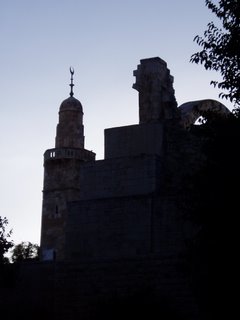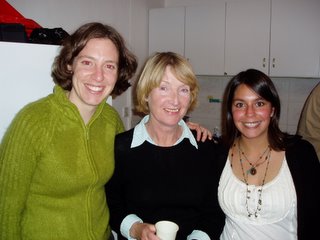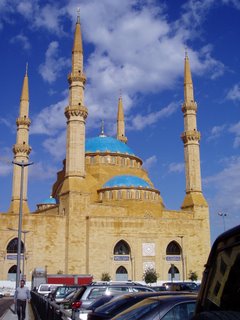
On Friday I had to choose between two itineraries: 1. Go to the Bil’in protest against the wall (a nonviolent resistance movement that has been taking place every Friday since this summer). 2. Go to my first ever Shabbat dinner. I decided to spend the morning working at HLT preparing for the nonviolence conference and then go to the Shabbat dinner in Jerusalem. I think that it is important for me to learn more about Jewish culture while I am in Israel, and I’m afraid I don’t get much of an opportunity to do that in the West Bank.
After working in Bethlehem I met G and A near the Damascus gate at 3pm. We walked around the old city for a while, then caught a taxi to take us to Meier’s apartment in West Jerusalem. Meier is a guy who I studied Arabic with this summer and who is currently taking classes at Hebrew University. I was a little nervous about going since I was pretty sure I would be the only Arab present and to be honest I have avoided West Jerusalem since I’ve been in Israel. Unfortunately, the cab ride into West Jerusalem did very little to alleviate my fears. Our taxi driver spent most of the ride telling us how all Muslims are bad and that Arab Muslims are trying to take over the world . . . We all pretty much ignored him until he started going on about how the Arabs/Muslims rioting in France are just ungrateful sods considering how the French were kind enough to let them immigrate. . . I couldn’t resist pointing out that the French colonized Algeria, killed thousands and thousands of people, destroyed the economy and were only driven out about 50 years ago. Of course, he didn’t want to hear any of that . . .
Needless to say I was very nervous by the time we got to the apartment. When we arrived Meier and his friend were running around doing last minute preparations before the sun went down. I didn’t get a full explanation of the Sabbath, but my understanding is that from sunset on Friday until sunset on Saturday observant Jews do not work . . . I think that this time is devoted for prayer, but I really need to read some more about this. The room slowly filled up with people, and I think there were 11 people in the end (I was, in fact, the only Arab). Most of the people at the dinner were American Jews studying at Hebrew University. Everyone was very curious about why on earth G, A, and I would want to study in the West Bank. The most common question was, “Aren’t you afraid for you safety living out there?” I said no, that I actually feel safer in the West Bank than in West Jerusalem, and then I bit my tongue before saying that there aren’t any suicide bombings in the West Bank . . .
All in all it was a little awkward, but the people were very friendly. We got some questions about life in the West Bank, but didn’t really talk politics until later in the evening after most of the people had left. Even then we all skirted around bigger issues . . . The Jewish prayers were beautiful to listen to and Meier was kind enough to explain the meanings of each one before they started. We drank a lot of Arak and wine and ate too much food and I generally had a nice time. Unfortunately, I never quite lost the feeling of being on guard, and watching what I said very carefully . . .
Below I have cut and paste a letter written by a guy I study with who went to the Bil’in protest. I thought it might be of interest . . .
**********************************************************************************
To my fellow Birthrighters on Kesher 4,I hope that you are all doing well. I’m writing to you from the West Bank town of Birzeit, north of Ramallah. I’ve been living in the West Bank for the past two and a half months, taking Arabic courses at Birzeit University and learning about the situation from the other side. I’m writing to you to describe an experience that I had yesterday in the>Palestinian town of Bil’in, which is northwest of Jerusalem in the West Bank. It was an experience that opened my eyes, and, to be honest, upset me and angered me. I think that it speaks directly to all of the things that we learned and discussed on our Birthright trip, which is why I’m sending this message to all of you.
For the last seven months, Bil’in has been the sight of weekly protests against the building of the separation wall, which, on its current route, will confiscate more than 50% of the villages land in order to allow for the expansion of a neighboring Israeli settlement. Many of you know that the International Court of Justice deemed the separation wall illegal in the summer of 2004, and ordered Israel to take it down (see
http://www.commondreams.org/views04/0720-12.htm, see also
www.amnesty.org, where you can find dozens of reports from Amnesty International. I worked in their Israel/Palestine office for two summers and can confirm the legitimacy of their research). The ruling was made precisely because the wall does not follow the border between the West Bank and Israeli, but travels deep within Palestinian territory. It cuts Palestinians off from vital resources such as water and, as in the case of Bil’in and dozens of other villages, takes their lands, and thus their livelihoods, from them. It also wraps itself around several settlements deep within the West Bank (putting them on the Israeli side of the wall), and completely surrounds several Palestinian towns and cities, cutting them off from rest of the West Bank.
Despite all of this, Israel’s high court rejected International Court’s ruling. I include this brief historical note so that, even if you support the building of the wall, you might understand why the people of Bil’in oppose it, and why they feel that they are in the right. Try to put yourself in their shoes for a moment. But back to yesterday in Bil’in. I attended the protest yesterday as a Jew who believes that continued violations of Palestinian human rights are not only despicable in and of themselves (and contrary to any non-fanatical interpretation of the Jewish religion), but are also contrary to the interests of the State of Israel and its people. The protest began with a march from the center of town to the site of the wall (which is not complete yet), about a ten-minute walk. Israelis and Jews from around the world made up one of the largest groups in attendance. Uri Avnery, a leader of the Gush Shalom (Israeli Bloc for Peace) was also in attendance. We marched down the road and then turned into a site where construction machines were working on the wall. The military was waiting for us. We chanted and cheered in Hebrew, Arabic, and English. Several of the Israeli and international activists sat down in front of one of the construction vehicles to temporarily stop its work as sign of protest. That's when the violence began.
The military threw stun grenades and began to severely beat the unarmed Israelis and internationals sitting on the ground in front them. I ran to try to help out, yelling at the soldiers that these people were unarmed, that they were participating in a peaceful and legal protest. I was met with batons, fists, and screams: “Fuck off!” I was hit in the face, I was grabbed and thrown and shoved and smacked. Those who were in front of the construction vehicle had their hair pulled, their faces scratched so badly that they bled, and their bodies kicked and beaten violently while they were lying helpless and terrified on the ground. They included many women and several elderly people. One young Israeli woman was hit with a baton in the throat and above the eye. She was in severe pain and almost in tears. The rest were dragged across ground (which in this particular place is covered in large, sharp stones) and thrown down towards the road, where the army had apparently decided they wanted us.
Once they got us there, calm was restored, though many of us were still in a state of shock. I can tell you without a doubt that not a stone had been cast, not a soldier or civilian threatened in any way, before we were attacked. However, we were not going to let the army scare us away, so we regrouped and started singing and chanting again, right at the soldiers line. The singing and chanting went on for 45 minutes, and once again, not a stone was cast, not a soldier threatened in any way. There is no way that our demonstration could have been called anything but completely peaceful. I was right there, a foot from the soldiers. Many of us were talking to them, having constructive political discussions as well as demanding to know why they had attacked a completely peaceful group. Many of them responded that they did not want to be there but were “just following orders.” I was absolutely dumbfounded. To say it was both to admit their fault, to admit that they opposed what was going on, and yet, at the same ntime, to admit that they didn’t have the courage to take a stand against it. But most shocking was that this “excuse” is, of course, the mantra that was used by those who oppressed and murdered Jews throughout the 20th century. I could hardly believe that these Jews had could bring themselves to say it to us. And yet, there it was, happening right in front of me.
As we chanted and sang, it became clear that the military was preparing something new for us. We saw the teargas canisters being loaded and the sound bombs being prepared. We saw attachments for rubber-coated bullets being clipped onto the end of M16s. And then, once again without any warning, not to mention provocation, they went mad. This time it was far worse. People were again thrown on the ground and beaten. Several people were hit with teargas canisters and were so consumed by the gas that they began to vomit and scream, and even collapase. This included the Mayor of Bil’in, who actually lost consciousness due to the gas. Those who were suffocating in the gas were actually beaten more and dragged along the ground. As we scattered, the soldiers began to cock their rifles and fire on us with rubber-coated bullets AS WE MOVED AWAY. Rubber coated bullets can be deadly at short range, and can severely injure people even at long range.
Then (and only then) the Palestinians began throwing rocks, an almost pathetic response in the face of the soldiers’ weapons. Scattering all throughout the olive grove, we ran for cover. The soldiers continued to fire. I watched as one of them cocked his rifle and fired live ammunition towards a group of Palestinian youth, though apparently he either missed or was firing over them. (We later found an empty shell casing where he had been standing, and I saw soldiers not more than a foot from me reloading their M16s with live ammunition about half an hour later). One Palestinian man was attacked by the soldiers, beaten and then carried away, while his wife sobbed and screamed at the soldiers to let him go. (Coincidently, he was released an hour later, which makes one wonder why he was arrested (not to mention beaten) in the first place.)
Before long, some of the soldiers had set up a sniping position on a huge mound of earth on the construction site. They fired on Palestinians who were so far away they could not possibly have posed any danger to them, and who, like all of us, were unarmed. Regardless, they had soon shot a 14-year-old boy in the head with a rubber-coated bullet. He was bleeding heavily from his head and was rushed in an ambulance to the hospital. (As far as I have heard, he has sustained no permanent injuries, though, had the bullet been an inch lower, he likely would have been blinded.)
Enraged and disgusted that anybody, but especially Jews, could act in such a disgusting way, I approached the hill where the snipers were and began to scream for them to stop. Every time one of them cocked his rifle, I yelled for him to stop. I was soon joined by a small group of other Israelis and internationals. And then something very strange happened. The soldiers not only un-cocked their rifles whenever I yelled, but they actually began trying to justify their actions to us. They were obviously embarrassed that what they were doing was being witnessed. They pointed down towards the group of Palestinian youth, whose stones (they had started throwing them at that point) never came within 50 meters of the soldiers. It was amazing that these soldiers, who despite the fact that they were firing on people with potentially deadly ammunition, were still so unsure of what they were doing that they felt that they needed to justify their actions to a bunch of protestors they had been beating and gassing only a few minutes before.
With all due respect to Joe (our tour guide), this was his “righteous” and “moral” army at work. This was the Israel “Defense” Force protecting the people of Israel. Of course, I have been reading and researching the abysmal human rights record of this so-called defense force for quite sometime, at Amnesty International, in the offices of the Palestinian human rights group Al-Haq, at school, and on my own. By comparison to their past (and on-going) crimes against the Palestinian civilian population (many of which I also witnessed in Ramallah in 2002, while the city was under siege), what I saw this week was minor.
However, it was the first time I had ever seen a Jew beat another Jew, helpless and unarmed, with batons and boots and rifle butts for sitting on the ground in front of a truck or chanting and singing on a public road. It was the first time that I ever saw a Jew gas another Jew, throw him onto the ground, beat him more, throw a stun grenade at his feet, and then fire on him as he tried to get away. And as for the internationals and Palestinians who were similarly treated, I think what I have recounted speaks for itself.
I am writing all of you, as a Jew and as a friend, to think twice about what we were taught on our Birthright trip. As a student of Israeli history, I can tell you that the history we were taught was extremely misleading, and contrary to the research of even the leading Jewish and Israeli historians. For any of you who are interested, I have attached a copy of my thesis, much of which was inspired by our Birthright trip, to this message. I recommend that you take a look at the books and articles in the bibliography. I also encourage you all to come to the West Bank and see for your own eyes what is going on here. I know many people who would be delighted to host you and talk to you, and I would be more than willing to put you in contact with them. You will be welcomed by the Palestinians as internationals and as Jews with the courage to really explore what is going on here. My best to all of you, and many thanks for reading all of this.
--Peter





